|
Content Standards: HS.UH.I.UE.2
Gather information and evidence from credible sources representing a variety of perspectives relevant to compelling and/or supporting questions in U.S. history. Learning Target: I can compare the differing approaches to Reconstruction, & I can assess its effects on the nation. Critical Vocabulary: Lincoln’s Second Inaugural Address, Ten Percent Plan, Wade-Davis Bill, Thirteenth Amendment, Freedmen’s Bureau, John Wilkes Booth, Andrew Johnson, Presidential Reconstruction Plan, Black Codes, Sharecropping, Debt Peonage, Radical Republicans, Thaddeus Stephens, Charles Sumner, Joint Committee on Reconstruction, Congressional Reconstruction Plan, Civil Rights Bill of 1866, Fourteenth Amendment, “Swing Around the Circle” Tour, “Waving the Bloody Shirt,” Reconstruction Acts, Tenure of Office Act, Impeachment, Scalawags, Carpetbaggers, 1868 Presidential Election, Ulysses Grant, Fifteenth Amendment, Ku Klux Klan, Enforcement Acts, Amnesty Act, Election of 1876, Rutherford B. Hayes, Samuel Tilden, Compromise of 1877, Redeemers, Lost Cause, Old South, Henry Grady, Poll Tax, Literacy Test, Grandfather Clause, Jim Crow Laws, Lynching, Plessy v. Ferguson Today's Agenda:
0 Comments
Content Standards: HS.UH.I.UE.2
Gather information and evidence from credible sources representing a variety of perspectives relevant to compelling and/or supporting questions in U.S. history. Learning Target: I can compare the differing approaches to Reconstruction, & I can assess its effects on the nation. Critical Vocabulary: Lincoln’s Second Inaugural Address, Ten Percent Plan, Wade-Davis Bill, Thirteenth Amendment, Freedmen’s Bureau, John Wilkes Booth, Andrew Johnson, Presidential Reconstruction Plan, Black Codes, Sharecropping, Debt Peonage, Radical Republicans, Thaddeus Stephens, Charles Sumner, Joint Committee on Reconstruction, Congressional Reconstruction Plan, Civil Rights Bill of 1866, Fourteenth Amendment, “Swing Around the Circle” Tour, “Waving the Bloody Shirt,” Reconstruction Acts, Tenure of Office Act, Impeachment, Scalawags, Carpetbaggers, 1868 Presidential Election, Ulysses Grant, Fifteenth Amendment, Ku Klux Klan, Enforcement Acts, Amnesty Act, Election of 1876, Rutherford B. Hayes, Samuel Tilden, Compromise of 1877, Redeemers, Lost Cause, Old South, Henry Grady, Poll Tax, Literacy Test, Grandfather Clause, Jim Crow Laws, Lynching, Plessy v. Ferguson Today's Agenda:
Content Standards: HS.UH.I.UE.2
Gather information and evidence from credible sources representing a variety of perspectives relevant to compelling and/or supporting questions in U.S. history. Learning Target: I can compare the differing approaches to Reconstruction, & I can assess their effects on the nation. Critical Vocabulary: Lincoln’s Second Inaugural Address, Ten Percent Plan, Wade-Davis Bill, Thirteenth Amendment, Freedmen’s Bureau, John Wilkes Booth, Andrew Johnson, Presidential Reconstruction Plan, Black Codes, Sharecropping, Debt Peonage, Radical Republicans, Thaddeus Stephens, Charles Sumner, Joint Committee on Reconstruction, Congressional Reconstruction Plan, Civil Rights Bill of 1866, Fourteenth Amendment, “Swing Around the Circle” Tour, “Waving the Bloody Shirt,” Reconstruction Acts, Tenure of Office Act, Impeachment, Scalawags, Carpetbaggers, 1868 Presidential Election, Ulysses Grant, Fifteenth Amendment, Ku Klux Klan, Enforcement Acts, Amnesty Act, Election of 1876, Rutherford B. Hayes, Samuel Tilden, Compromise of 1877, Redeemers, Lost Cause, Old South, Henry Grady, Poll Tax, Literacy Test, Grandfather Clause, Jim Crow Laws, Lynching, Plessy v. Ferguson Today's Agenda:
Content Standards: HS.UH.I.UE.2
Gather information and evidence from credible sources representing a variety of perspectives relevant to compelling and/or supporting questions in U.S. history. Learning Target: I can compare the differing approaches to Reconstruction, & I can assess their effects on the nation. Critical Vocabulary: Lincoln’s Second Inaugural Address, Ten Percent Plan, Wade-Davis Bill, Thirteenth Amendment, Freedmen’s Bureau, John Wilkes Booth, Andrew Johnson, Presidential Reconstruction Plan, Black Codes, Sharecropping, Debt Peonage, Radical Republicans, Thaddeus Stephens, Charles Sumner, Joint Committee on Reconstruction, Congressional Reconstruction Plan, Civil Rights Bill of 1866, Fourteenth Amendment, “Swing Around the Circle” Tour, “Waving the Bloody Shirt,” Reconstruction Acts, Tenure of Office Act, Impeachment, Scalawags, Carpetbaggers, 1868 Presidential Election, Ulysses Grant, Fifteenth Amendment, Ku Klux Klan, Enforcement Acts, Amnesty Act, Election of 1876, Rutherford B. Hayes, Samuel Tilden, Compromise of 1877, Redeemers, Lost Cause, Old South, Henry Grady, Poll Tax, Literacy Test, Grandfather Clause, Jim Crow Laws, Lynching, Plessy v. Ferguson Today's Agenda:
Content Standards: HS.UH.I.UE.2
Gather information and evidence from credible sources representing a variety of perspectives relevant to compelling and/or supporting questions in U.S. history. Learning Target: I can compare the differing approaches to Reconstruction, & I can assess their effects on the nation. Critical Vocabulary: Lincoln’s Second Inaugural Address, Ten Percent Plan, Wade-Davis Bill, Thirteenth Amendment, Freedmen’s Bureau, John Wilkes Booth, Andrew Johnson, Presidential Reconstruction Plan, Black Codes, Sharecropping, Debt Peonage, Radical Republicans, Thaddeus Stephens, Charles Sumner, Joint Committee on Reconstruction, Congressional Reconstruction Plan, Civil Rights Bill of 1866, Fourteenth Amendment, “Swing Around the Circle” Tour, “Waving the Bloody Shirt,” Reconstruction Acts, Tenure of Office Act, Impeachment, Scalawags, Carpetbaggers, 1868 Presidential Election, Ulysses Grant, Fifteenth Amendment, Ku Klux Klan, Enforcement Acts, Amnesty Act, Election of 1876, Rutherford B. Hayes, Samuel Tilden, Compromise of 1877, Redeemers, Lost Cause, Old South, Henry Grady, Poll Tax, Literacy Test, Grandfather Clause, Jim Crow Laws, Lynching, Plessy v. Ferguson Today's Agenda:
Content Standards: HS.UH.I.UE.2
Gather information and evidence from credible sources representing a variety of perspectives relevant to compelling and/or supporting questions in U.S. history. Learning Target: I can summarize the events that led to the Civil War, & I can evaluate the degree to which each contributed to the conflict. Critical Vocabulary: Nat Turner’s Rebellion, Underground Railroad, Harriett Tubman, “Fire-Eaters,” Stephen A. Douglas, Compromise of 1850, Fugitive Slave Act, Harriet Beecher Stowe, Uncle Tom’s Cabin, Ostend Manifesto, Kansas-Nebraska Act, New England Emigrant Aid Company, “Bleeding Kansas,” Republican Party, Dred Scott Decision, Abraham Lincoln, Freeport Doctrine, John Brown, Pottawatomie Creek, Lecompton Constitution, Harpers Ferry, Constitutional Union Party, Election of 1860, Crittenden Compromise, Confederate States of America, Jefferson Davis, First Inaugural Address, Fort Sumter Today's Agenda:
Content Standards: HS.UH.I.UE.2
Gather information and evidence from credible sources representing a variety of perspectives relevant to compelling and/or supporting questions in U.S. history. Learning Target: I can summarize the events that led to the Civil War, & I can evaluate the degree to which each contributed to the conflict. Critical Vocabulary: Nat Turner’s Rebellion, Underground Railroad, Harriett Tubman, “Fire-Eaters,” Stephen A. Douglas, Compromise of 1850, Fugitive Slave Act, Harriet Beecher Stowe, Uncle Tom’s Cabin, Ostend Manifesto, Kansas-Nebraska Act, New England Emigrant Aid Company, “Bleeding Kansas,” Republican Party, Dred Scott Decision, Abraham Lincoln, Freeport Doctrine, John Brown, Pottawatomie Creek, Lecompton Constitution, Harpers Ferry, Constitutional Union Party, Election of 1860, Crittenden Compromise, Confederate States of America, Jefferson Davis, First Inaugural Address, Fort Sumter Today's Agenda:
Content Standards: HS.UH.I.UE.2
Gather information and evidence from credible sources representing a variety of perspectives relevant to compelling and/or supporting questions in U.S. history. Learning Target: I can summarize the events that led to the Civil War, & I can evaluate the degree to which each contributed to the conflict. Critical Vocabulary: Nat Turner’s Rebellion, Underground Railroad, Harriett Tubman, “Fire-Eaters,” Stephen A. Douglas, Compromise of 1850, Fugitive Slave Act, Harriet Beecher Stowe, Uncle Tom’s Cabin, Ostend Manifesto, Kansas-Nebraska Act, New England Emigrant Aid Company, “Bleeding Kansas,” Republican Party, Dred Scott Decision, Abraham Lincoln, Freeport Doctrine, John Brown, Pottawatomie Creek, Lecompton Constitution, Harpers Ferry, Constitutional Union Party, Election of 1860, Crittenden Compromise, Confederate States of America, Jefferson Davis, First Inaugural Address, Fort Sumter Today's Agenda:
Content Standards: HS.UH.I.UE.2
Gather information and evidence from credible sources representing a variety of perspectives relevant to compelling and/or supporting questions in U.S. history. Learning Target: I can summarize the events that led to the Civil War, & I can evaluate the degree to which each contributed to the conflict. Critical Vocabulary: Nat Turner’s Rebellion, Underground Railroad, Harriett Tubman, “Fire-Eaters,” Stephen A. Douglas, Compromise of 1850, Fugitive Slave Act, Harriet Beecher Stowe, Uncle Tom’s Cabin, Ostend Manifesto, Kansas-Nebraska Act, New England Emigrant Aid Company, “Bleeding Kansas,” Republican Party, Dred Scott Decision, Abraham Lincoln, Freeport Doctrine, John Brown, Pottawatomie Creek, Lecompton Constitution, Harpers Ferry, Constitutional Union Party, Election of 1860, Crittenden Compromise, Confederate States of America, Jefferson Davis, First Inaugural Address, Fort Sumter Today's Agenda:
Content Standards: HS.UH.I.UE.2
Gather information and evidence from credible sources representing a variety of perspectives relevant to compelling and/or supporting questions in U.S. history. Learning Target: I can summarize the events that led to the Civil War, & I can evaluate the degree to which each contributed to the conflict. Critical Vocabulary: Nat Turner’s Rebellion, Underground Railroad, Harriett Tubman, “Fire-Eaters,” Stephen A. Douglas, Compromise of 1850, Fugitive Slave Act, Harriet Beecher Stowe, Uncle Tom’s Cabin, Ostend Manifesto, Kansas-Nebraska Act, New England Emigrant Aid Company, “Bleeding Kansas,” Republican Party, Dred Scott Decision, Abraham Lincoln, Freeport Doctrine, John Brown, Pottawatomie Creek, Lecompton Constitution, Harpers Ferry, Constitutional Union Party, Election of 1860, Crittenden Compromise, Confederate States of America, Jefferson Davis, First Inaugural Address, Fort Sumter Today's Agenda:
|
A life is not important except in the impact it has on other lives.
-Jackie Robinson AnnouncementsMarch 6: Bullitt Day
March 30-April 3: Spring Break ResourcesArchives
March 2020
|
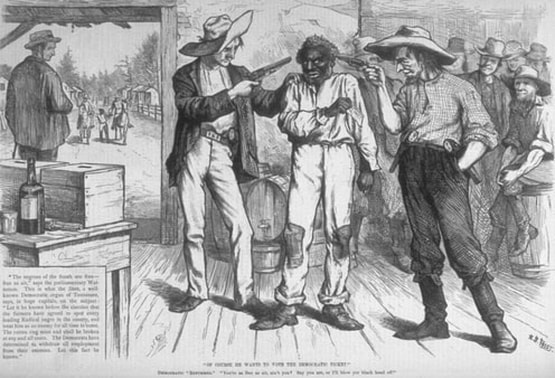
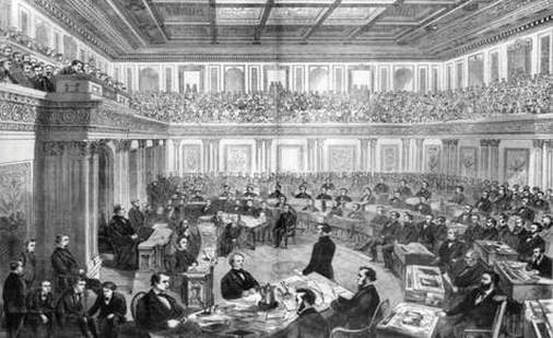
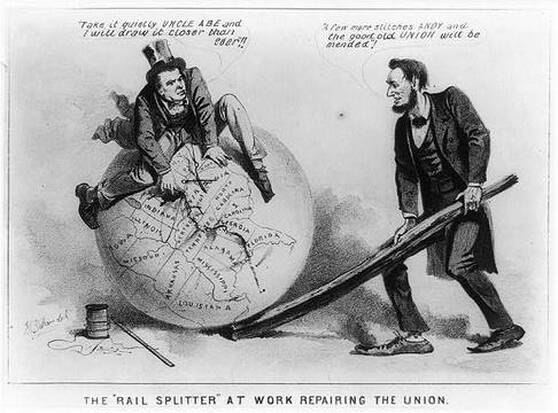
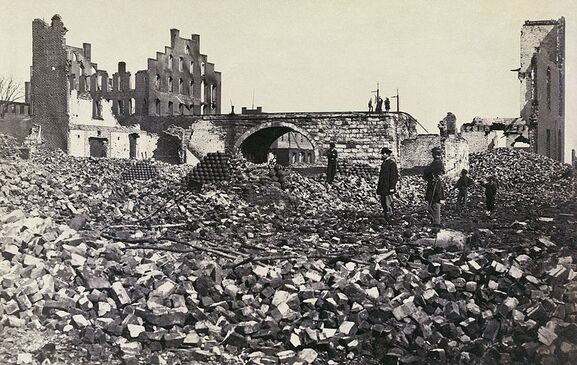
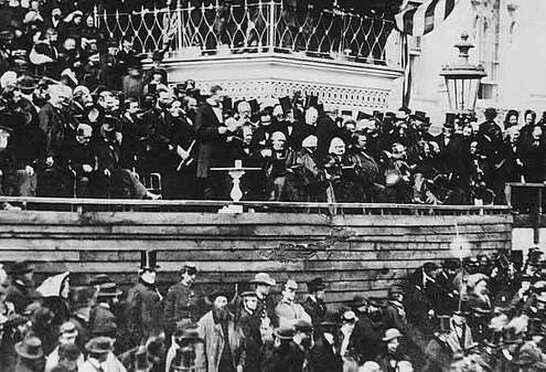
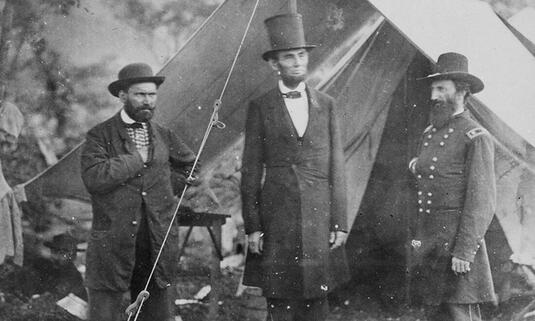
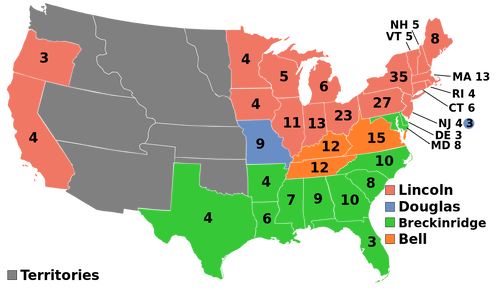
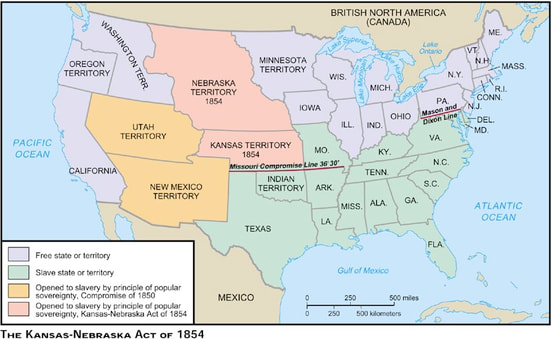
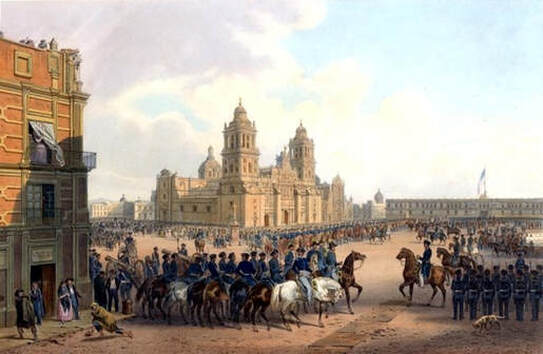
 RSS Feed
RSS Feed
